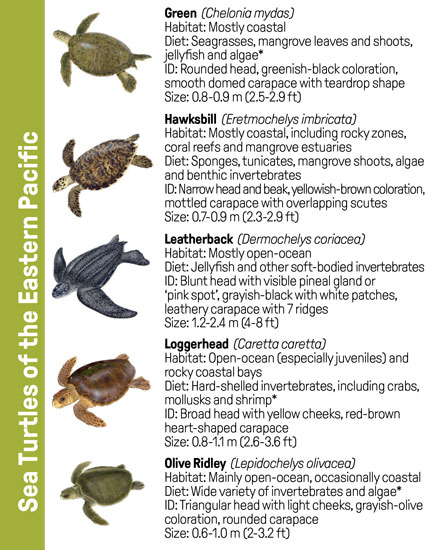Be a Sea Turtle Spotter
All of the marine sea turtle populations in Baja California Sur are listed as endangered by Mexico and by the U.S. Fish and Wildlife Service. With your help scientists can map out sea turtle distribution and identify high priority conservation areas of these magnificent creatures. By reporting your sea turtle sightings, you can help scientists better understand changes in populations, movements, foraging locations and habitat conditions.
From your boat or from the beach report your sea turtle sightings from anywhere in the Eastern Pacific Ocean and Sea of Cortez. To help identify the species download and print the Sea Turtle Identification Chart. This invaluable information will help us determine how we can help save sea turtles.
Here is How to Participate
- Create your account on iNaturalist.org and join the Sea Turtle Spotter Project
- Download the iNaturalist app on your phone or tablet and sign in
- Learn to identify sea turtles in marine habitats you visit
- Record your sea turtle sightings on the Sea Turtle Spotter with:
- Location coordinates
- Clear photos
- Species identification
- Notes on behavior or condition
- Upload your sightings when you have internet access
Or email your photos and videos to spotter@upwell.org with the following information:
Required: Date, Time, Coordinates (e.g., Lat: 24.533633 Lon: -109.927294)
If Available: Species, turtle condition, behavior, habitat
Feel great about your work as a citizen scientist and encourage your friends to become Sea Turtle Spotters too!
Your Actions Matter!
- If you eat seafood, make sure it was captured using selective methods that reduce sea turtle mortality.
- Avoid single-use plastics; refuse straws and bring your own reusable bags, to-go containers and utensils. Clean up stray plastics before they end up in the ocean.
- Choose ecotour operators that support conservation science and protect turtles when making business decisions.
Learn More About Sea Turtles at www.upwell.org
Upwell's mission is to protect endangered sea turtles by reducing threats at sea, including fisheries bycatch, ship strikes, pollution, climate change and other detrimental human activities.
